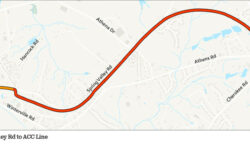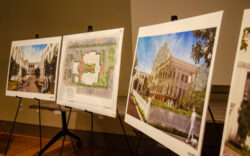A 116-room hotel proposed for the former UGA president’s house on Prince Avenue is too big for the surrounding neighborhood, according to the majority of attendees at a Historic Athens town hall meeting on the development.
About 50 people—many, but not all, who live in Boulevard or the nearby Cobbham neighborhood—gathered around tables Aug. 19 at First Christian Church of Athens at the corner of Dougherty and Pulaski streets, about five blocks away from president’s house, to discuss the proposal and report back to the group. The size of it (about 90,000 square feet) drew the most criticism, with attendees preferring a smaller hotel of about 50 rooms. “You don’t build a ginormous Walmart in the middle of Cobbham or any neighborhood,” one man said.
Plans for the hotel call for a new U-shaped two-story structure with underground parking behind the 170-year-old house, enclosing a courtyard to shield backyard neighbors from noise, as well as a new kitchen adjacent to the house. The house itself would become a bar and restaurant on the first floor, with a suite upstairs. The facade would be maintained, as would the front gardens and part of the back gardens. Two outbuildings would be relocated farther back on the property, with one cottage potentially becoming a museum.
Developer Jeff Payne, a Gainesville eye doctor who owns Capstone Property Group, and representatives from Athens architectural firm Arcollab were present but did not address the crowd. Payne told Flagpole that Capstone explored a 70-room hotel, but the numbers didn’t work financially. “The property’s expensive,” he said—the University System of Georgia put it on the market for $5 million. “You have to have enough money to maintain the house. And you have to have a return [on investment].”
Lee Epting, whose catering and event business contracts with the Athens-Clarke County government to steward the nearby Taylor-Grady House, seconded Payne’s comments about the expense of maintaining a historic home, noting that recent roof repairs to the Taylor-Grady House’s kitchen cost nearly $70,000.
Historic Athens Executive Director Tommy Valentine said the University of Georgia had not been doing a good job of maintaining the house, and that he feared it could fall into disrepair if it remains unsold for an extended period of time. The house had a $2 million backlog of upgrades and repairs when the University System of Georgia put it on the market in 2023. For comparison, Valentine cited the historic house at 357 S. Milledge Ave., which has been boarded up for 20 years and is suffering from what preservationists term “demolition by neglect.”
Another frequently raised concern was the effect of the development on Emmanuel Episcopal Church next door. Blasting for the underground parking could shatter the church’s fragile stained glass windows, several attendees said.
Not all of the feedback was negative. One attendee noted that the hotel would provide jobs within walking distance, and asserted that the hotel’s scale is proportional to the nearly 5-acre property. “What’s going there could be much worse,” he said. “The density could be much worse. The asphalt could be much worse.”
The property is currently zoned for government, and so a rezoning is required for the development to move forward. An initial hearing before the Athens-Clarke County Planning Commission is scheduled for Sept. 4. Most of the surrounding properties are zoned commercial-neighborhood, which has a limit of 10,000 square feet for any commercial building other than medical offices, so Capstone will seek a waiver. But if the waiver is turned down, the C-N zoning would allow for developing up to 75% of the property, including building about 38 two-bedroom apartments by right, according to architect Lori Bork Newcomer.
Traffic was also a concern, although Payne said he doesn’t believe the hotel will generate much of it. “The thing about a hotel that’s different from an office building is people come and go at different times,” he told Flagpole. “Once people park, we expect them to stay [parked] and walk to downtown.”
Payne said he doesn’t envision additional traffic requiring the removal of the hard-fought-for bike lanes on that stretch of Prince, and in fact he plans to offer guests bikes to get around. “I don’t see that being the case,” he said. “I really don’t.”
Like what you just read? Support Flagpole by making a donation today. Every dollar you give helps fund our ongoing mission to provide Athens with quality, independent journalism.









